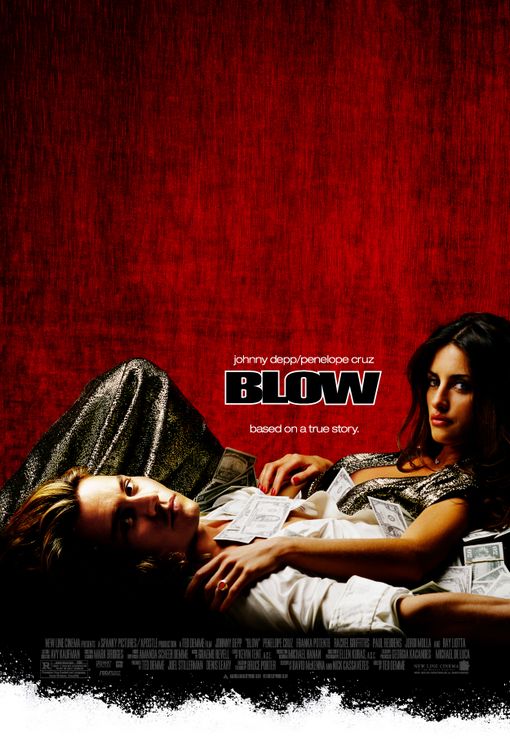“Sympathetic Drug Dealer”

| None | Light | Moderate | Heavy | |
|---|---|---|---|---|
| Language | ||||
| Violence | ||||
| Sex | ||||
| Nudity |
What You Need To Know:
BLOW is terribly photographed. The aging makeup is almost as bad, and the acting is merely fair overall. Although the story of BLOW shows how dealing drugs destroys George’s life, it takes a while to get there. Also, the movie strongly suggests that it’s not really George’s drug dealing that gets him into trouble, it’s the women in his life as well as his love for money. Ultimately, therefore, the movie is mostly an attempt to turn one of the biggest drug dealers of the last 50 years into a sympathetic character instead of the scurrilous gangster he really is
Content:
(HH, Ho, LLL, VV, S, AA, DDD, M) Liberal humanist worldview regarding the Colombian cocaine explosion of the 1970s & 1980s that tries to turn a major drug dealer into a sympathetic character, plus homosexual drug dealer who sometimes appears surrounded by his sex partners; at least 126 obscenities & 20 profanities; brief violence such as drug dealer executes prisoner by shooting him brutally in the head, some fighting & yelling, people point guns at one another, & police arrest people; implied fornication & implied homosexual behavior; no nudity but women in bikinis & sexy outfits; alcohol use & drunkenness; smoking, drug abuse & constant selling of drugs; and, lying, betrayal & movie displays a hatred of women.
More Detail:
Based on the book by Bruce Porter, the movie stars Johnny Depp as George Jung. He narrates the story, which starts by telling how George grew up with a loving father and a disagreeable, money-loving mother in Boston, Mass. The mother never appreciates the father’s hard work, so George vows never to be among the working poor like his old man.
In the late 1960s, George moves out to Southern California with his boyhood friend, Tuna. In Venice, Calif. near Los Angeles, George and Tuna heartily join the free-wheeling hippie lifestyle of sex, music and marijuana smoking. In search of a way to make ends meet, George discovers he has a talent for selling illegal pot. Eventually, he hooks up with a homosexual hairdresser named Derek, played by Paul Reubens, who sells the stuff out of his popular salon. George scouts out a good Mexican source for the marijuana and, with help from another friend from Boston, starts a very lucrative business on the East Coast.
George’s world crumbles, however, when he’s arrested in Chicago while carrying some marijuana. He decides to skip bail and go on the lam. A year later or so, George shows up at his parents’ home, but his mother turns him in to the cops “for his own good.” While in jail, he meets a man from Colombia named Diego. When they get out of jail, Diego sets him up with Pablo Escobar, the infamous, ruthless cocaine kingpin from Medellin, Colombia. Using his old contacts in California and Boston, George and his new “friends” set up the lucrative cocaine trade that forever changed the American “drug wars.”
Immense wealth follows for George and his business partners. George even takes a Colombian trophy wife, played by Penelope Cruz. When Diego steals his connection, the homosexual Derek, George decides to get out of the business altogether because he has enough money. His wife’s own drug habit, however, upsets the applecart, and George’s life quickly goes downhill from there.
BLOW is terribly photographed, as if the crew for the movie was itself high on drugs when they filmed it. The aging makeup is almost as bad, which practically destroys the realism of the story. The acting in the movie is merely fair overall.
Although the story of BLOW shows how dealing drugs eventually destroys George’s life, it takes a while to get there. Also, the movie strongly suggests that it’s not really George’s drug dealing that gets him into trouble, it’s the women in his life as well as his love for money. Ultimately, therefore, the movie is mostly an attempt to turn one of the biggest drug dealers of the last 50 years into a sympathetic character instead of the scurrilous gangster he really is. BLOW is another attempt by Hollywood to undermine the country’s efforts in fighting the drug war which is ravaging the nation’s youths. What these people want is to force the American taxpayer to foot the bill for the drug habits and drug rehabilitation of countless numbers of junkies, a number which will surely increase if drugs are made legal.
Of course, the Bible tells us that money is the root of all kinds of evil, not the root of all evil. Jesus Christ also tells us in Mark 12:30 to worship God with all of our “heart, soul, mind, and strength.” That kind of worship takes a clear mind, a mind that has not become wasted by drug addiction. A childlike faith in Jesus Christ is the ultimate answer to battling such a problem.


 - Content:
- Content: 

